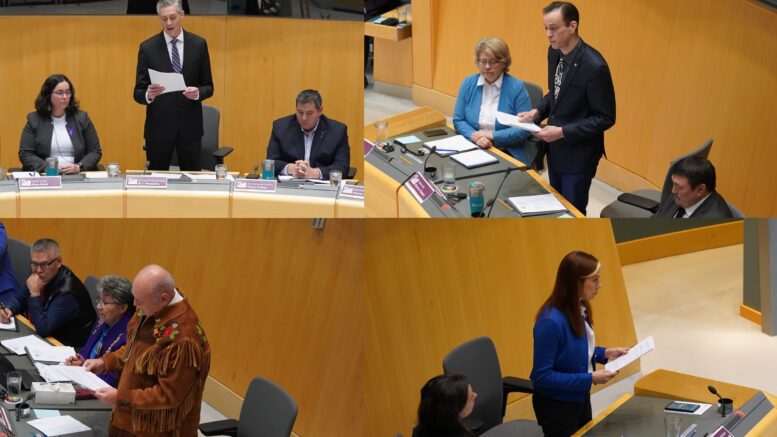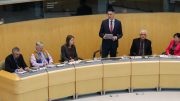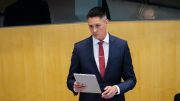The nominations for Premier of the Northwest Territories are in, and each of the candidates has made their appeal to the N.W.T.’s small and Indigenous communities.
R.J. Simpson, Kieron Testart, Shane Thompson and Caroline Wawzonek all put their names in the hat for premier on Thursday. Each gave a 20-minute pitch explaining why they should get the top job. All four made overtures to Indigenous governments and communities, but differed in their approaches and proposals.
Here’s some of what they had to say:
R.J. Simpson
Hay River North MLA R.J. Simpson said the territorial government should work with the council of leaders and Indigenous governments to advance land-claim and self-government negotiations. Rather than continuing to lobby the federal government for more money, Simpson said, the GNWT should finalize land claim and self-government agreements, and that in doing so, “more money will flow into the N.W.T.”
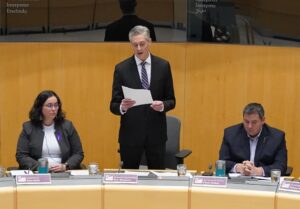
(Ian Down/CKLB photo)
Simpson also appealed to his record as Minister of Education, Culture and Employment: He says he allowed the Tłı̨chǫ Government to “[drive] the process” for building a new school in Behchokǫ̀. He also pointed to the overhaul of the Education Act under his tenure, which involved consultation with Indigenous governments. “There was no roadmap for these instances I talked about, with the school projects, for the Education Act. I had to learn as I went.”
Also Simpson’s tenure, the department removed the limit on grants for Northern Indigenous students. He said under his tenure, regular engagement would continue between the Department of Education, Culture and Employment and Indigenous governments.
Kieron Testart
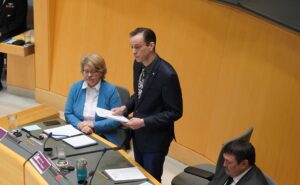
(Ian Down/CKLB photo)
If elected, Range Lake MLA Kieron Testart pledges to hold annual leadership summits between caucus and Indigenous governments. He said he would “Indigenize” the policy development so that programs are tailored to the needs of each community.
Speaking on small communities, Testart said the municipal funding gap is “a travesty of public administration. And it’s unacceptable. Closing the gap is not a matter of priorities: It is a moral obligation to peace, order and good government.” He pledged to address the funding gap in the GNWT’s first operational maintenance budget.
Testart warned any progress made by the 19th Assembly in improving relationships with Indigenous governments needs to be protected by the NWT’s Constitution. “We need to bring co-drafting into the public government so it’s protected by the Constitution of the N.W.T.,” he said. He said he would hold a constitutional convention in two years at the latest.
He said Indigenous nations should be given oversight of what the government does, “as either an upper house or an Indigenous Senate.”
Shane Thompson
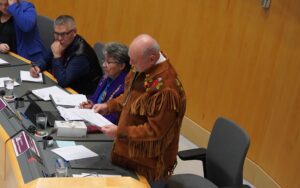
(Ian Down/CKLB photo)
Nahendeh MLA Shane Thompson appealed to his time working and living in communities like Inuvik, Kugluktuk, and Fort Simpson. “Spending my life living and working in Northwest Territories has given me the opportunity to familiarize myself with our communities, getting to know the people and hearing their challenges and successes,” he said.
Thompson said in the lead-up to the election, he reached out to several Indigenous community leaders to discuss ways to improve relations. “I can tell you I’ve had several very positive conversations and I’ve heard some good advice and ideas on what needs to be done moving forward to strengthen their trust and improve how we work together.” In particular, he said it’s important for the GNWT to collaborate on land and natural resource legislation.
He said Project Finance for Permance (PFP) would bring in “hundreds of millions of dollars of long-term investments to the territories for Indigenous governments and communities.” PFP is a collaborative model aimed at long-term conservation.
Caroline Wawzonek
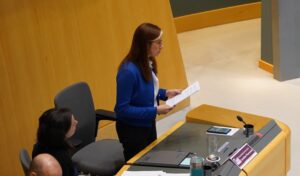
(Ian Down/CKLB photo)
“If you want to get to know me and my style, what I believe in, my values as a professional, then I would suggest that you read the objectives for change that are in the government of the Northwest Territories’ action plan in response to the National Inquiry into Missing and Murdered Indigenous Women and Girls, titled ‘Changing the Relationship,'” said Yellowknife South MLA Caroline Wawzonek.
These goals, as outlined in the document, are: Acknowledge the crisis of violence against women, girls, and the LGBTQ+ community; Establish trust between relevant parties; Establish person-centred services; And ensure accountability.
Wawzonek, who is of Métis heritage but said she “[doesn’t] identify as Indigenous,” said the GNWT needs to do a better job of sharing information with Indigenous communities.
“Of course, we should be going to Ottawa together,” she said. “This seems obvious to me, and it seems simple, but it is not happening.”
Wawzonek also pointed to the Indigenous Recruitment and Retention Framework, which was introduced during her tenure as Minister Responsible for the Public Service.
The premier will be chosen on Thursday, Dec. 7, through a secret vote by MLAs.

